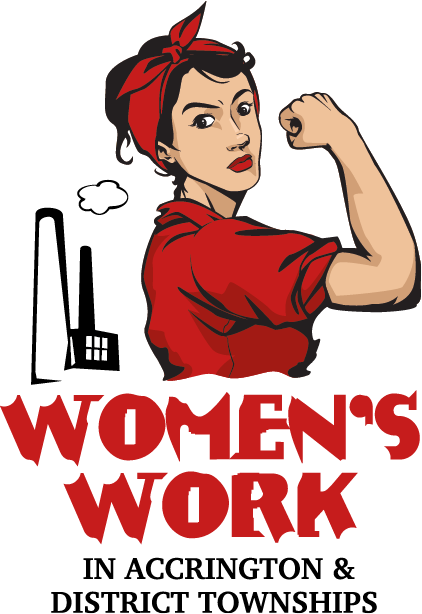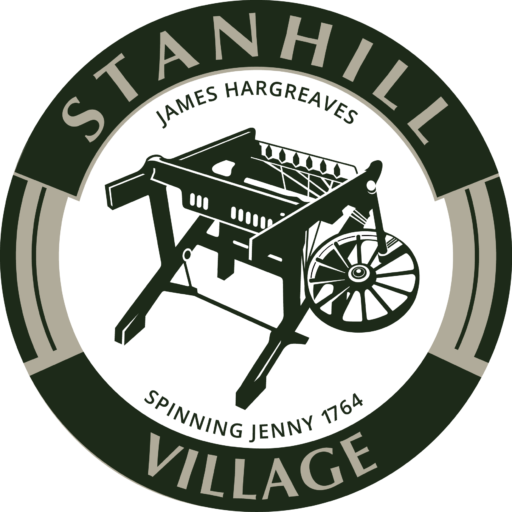(My name is) Mercy Bradwell Peacock Matthews born on the 9th of February 1934.
Mum’s working life at that time, according to my birth certificate, she was a boarding housekeeper, but she had been a secretary at Accrington Grammar School, which is where she met my father. It was in the art department there, I believe he was Head of Art actually.
She started (work) on leaving school which I imagine was 13 and went into a cotton mill I presume, because that’s what Accrington is famous for isn’t it. I only know that because she she could do a weaver’s knot and she could lip read, and later in life she dressed up as a Lancashire Weaver of 1913 at a fancy dress. And then she went to night school and became a secretary at some point, I don’t know when, but also she did singing with the silent films. And the only one I remember her mentioning was the Four Horsemen of the Apocalypse and she got a shilling a night for that.
I was always going to be a teacher. It was accepted right through my life that that’s what I was going to be but the other girls in my class, I was in a grammar school all of all girls, they were going to be secretaries, or they were going into nursing or they were going into teaching. One of them wanted to become a librarian, so it was that sort of thing. But it was the lower class educationally speaking, if you like, we were in two groups and it was the higher class that went onto higher education and the lower class that didn’t, and some of them were going into shops or they did hairdressing and that was about all we ever thought of.
There was a two-year training course because they wanted teachers back in the mid-50s, early 50s. It was very much like school actually, we had lectures 9 till 12 and 2 till 5 and again in the evening during our first year. We were under supervision in a room doing homework, is one way of putting it I suppose, but working on subjects that we’d been given with a second year supervising us. So we didn’t get out at all during the week, in fact we also had jobs to do. Get up, make our beds, clean our bedrooms, and jobs around the college like dusting windowsills and things.
We had Saturday afternoons free, and we obviously had lectures on Saturday morning, and on Sunday we had religious lectures and church every morning because it was a Catholic Convent School, College, so we went to mass every morning. Sunday afternoons we were free as well. But we were all locked out at 10 at night!
Well, I applied for and got a job in Bedford County which was on the outskirts of Luton City town whatever Luton is! or was at that time, in what was a County Primary School with children aged from 5 to 14. The school (leaving) age rose at that time, I think to 15, and the kids who had to stay on that extra year did not like it. Fortunately, in that school they did have a teacher who understood and gave them jobs like gardening, mending our bicycles, repairing the cars of the staff, odd jobs like that as well as doing some classroom work. So, he was very understanding. We did our normal teaching. It was like a family there though, the staff, there were 11 of us, and we all just got on well together, some male some female, there was no difference between us in any way. It was an excellent place.
I was only there for 2 years and then I decided I was going to go somewhere else and possibly get a little more money although I felt quite well recompensed really. And I went to a Convent School at Waterlooville near Portsmouth. But I was only there for a term because during that summer holiday I met the person who was going to become my husband and he kept coming up to Portsmouth to visit and I gave my notice in for Christmas, claiming that my mother needed me. Very naughty of me! and moved back to Plymouth and was teaching at a school in Plymouth for the rest of that school year, got married during that year and moved. I had to catch three buses to go to this particular school! and after was moved anyway, because it was an infant school and I was a junior teacher, and I was moved up to a junior school, which meant two buses instead which was good, and I taught there for the following year until when I was pregnant, so I had to leave.
You didn’t stay on (when you got pregnant). Mothers weren’t expected to carry on working when they had small children. I think that was really the basis of it. Looking back, I feel pretty sure if you had a baby at home you stayed at home, and I’m not sure if that just applied to teaching or to other jobs as well or not but certainly that was the feeling I have. The people I got to know who were expecting around that time weren’t at work. They were definitely at home looking after the house and the husband.
Whilst I was still pregnant and sewing baby clothes and knitting baby clothes, we were beginning to build up a television rental business. My husband worked as a civilian for the RAF radar station nearby and that was shift work which was great because it was 8 day shifts, so some days he was off in the afternoon and some days he had the whole day off and so on. And he worked night shifts as well you see and it meant that he was available to do in the first instance, selling televisions to a new housing estate, and then he realised that there was a niche for rental. I would be sitting in the car sometimes, he went to visit somebody to sort out a job wherever it happened to be, it was an outing for me in a sense, sitting there in the car whilst he went inside and did the job.
So that was autumn ’58 and the following year there was plenty of work for me to do and we set up an office in the house and I worked there. Didn’t have another child until my daughter was 3 and by the way we’d moved to a new house, from a flat into a house. My daughter was 3 years old when we moved, just over 3, but she was quite used to answering the telephone phone and giving the number and then saying just a moment please I’ll go and get her! No wonder she’s managerial now!
We took on what my eldest daughter called girlies, I think we called them Man Fridays at the time, youngish girls who would look after the children and enabled me to sit in the office while she got on and looked after the children, did some housework and then I’d go through and cook a meal for us all and you know that’s how we coped at that time. Then we had a shop after a while, but I think I’d got to my third child by then because I think she was about 5 when we bought the shop, or rather my husband bought the shop, and then I was working over at the shop, but the children were at school then you see. So it was a question of getting them off to school and then going over and opening up the shop.
In the early 60s when I had my second child, because father-in-law was beginning to get to retirement age and we had this land, my husband had bought this land and he took some of the dairy cows that had calves, so he would go off to market sometimes, buy a couple of extra calves that could suckle the cows, but when they were first calved down I would milk out the colostrum and until we got the extra calves I would keep on milking them. It was something I could do, and my husband somehow couldn’t, I don’t know why he couldn’t manage it, but I did.
So sometimes it would be a question of going out there quite early in the morning and then after we got the shop, I would go out sometimes, and then he’d drop me back at the shop and I would go in to the toilet in the cafe next door, and get changed, grab a cup of coffee and go into the shop and open up. In the meantime, my eldest daughter was about 11 or 12, she was getting the other children off to school. They were 3 and 5 years younger than her. She was telling me yesterday that her father used to come back and collect her and take her to school because she went to school in the neighbouring town in Plymouth and we were 8 miles out from there. I didn’t know that, because I’d been dropped off at the shop and I thought she was catching the bus every day.
I had a bike to get myself from the house to the shop, it was about half a mile up a hill and then along a bit of level. So it was lovely at lunchtime to pop back home again and it was good, it didn’t take me too long then, I could get home, have something to eat and get back again and open up at 2 and then get home at teatime. The children would be already home. I think my youngest daughter would come across to the shop when she got off the school bus, or the bus from school, it wasn’t a school bus, and she’d walk across to where the shop was and would be over there for a while and then we would go home together but not every day, sometimes she would go straight home. When I think about it, they really did have to look after themselves quite a bit! Because school was till 4 and by the time they got home it was 20 past or 4:30 and then I got home just after 5 so they weren’t on their own very long.
I had a couple of (driving) lessons with people without him (my husband) knowing in the first instance and then he realised I was having these lessons and he got somebody to come and take me out just around the perimeter of the old aerodrome at Yelverton and to come back and report to him as to whether I would make a driver! And I don’t know what they said but I carried on with driving lessons anyway and passed my test!
Right at the very beginning when we first married, he was still working at the RAF station as a civilian. His pay was around £12 a week which I think was pretty good for the mid 50s . I had £3 a week for housekeeping, he paid the rent of £3 a week as well and then there was the rest of it left over. Which is presumably how he was able to save up in order to buy the house and then later buy the shop and the land etc. He was pretty good with money I suppose. He’d always been a bit entrepreneurial I gather because when he was at school, he bought packets of stamps and sold them individually to children at school! So making a bit of money that way.
(I wasn’t paid anything) Until somebody remonstrated with him and suggested to him that I ought to get some sort of money and I then got a shilling for every for foolscap sized rental agreement that I typed up. In the first instance they had to be typed on an ordinary typewriter and then we got a Gestetner duplicator so it was a question then of cutting the stencil and rolling them off which was much easier of course. But by then we were really putting out a lot of televisions. In the first year we had six out the second year, it had gone up to 24 and it kept on multiplying.
Somebody suggested it (that her husband make her a partner in the business) and he said that’s the worst kind of partnership. I felt I ought to be sharing in a way, but it was very very different in those days because the men were still in control, shall we say. They were the ones that made the decisions so that was that, you know.
Sort of aware yes (of women’s rights movement), but no time to consider it at all. What with the business, and the farm, and the house as well, it was pretty well occupying my time.
There was a friend down the road who had 5 children and we would occasionally get together for a cup of coffee, but not very often. And there wasn’t time, there wasn’t time, I didn’t even get time to see my mother, she would have to come and visit me. I could never arrange to visit her because there might be something that needed to be done at the farm or something like that.
I had an allowance for the housekeeping so I just had to make it to go wherever I could make it go you know. Buy food that wasn’t too expensive, we didn’t eat steaks, we had cottage pies. I was lucky in one respect because my husband’s uncle was a butcher.
I was able to I think, have beef and meat a little bit more cheaply at that time which helped a lot.
I kept an account book and if he wanted to see it, it was there for him to see but so long as I didn’t go asking for extra money all the time it was ok. But I was responsible in the first place for paying the electricity as well as buying the food and paying the laundry and stuff, (no washing machines at first) and then at one point I managed to persuade him the electricity could come out of the business therefore it should come off my allowance and I therefore had a little bit more money to spend.
The family allowance had -the way it was dealt with, had changed. It was always paid to the woman and, because in the past men had drunk it all away, it was paid to the woman so she had some money for looking after the children and the government then decided at some point, that they would change the way that they made allowances against your pay for paying tax, and I really don’t understand what exactly was going on but it meant that he wasn’t getting that, he was getting an allowance for it. If I didn’t get that money, he would get that bit more. It seems a bit mad looking at it now.
So I cancelled my family allowance. And then later that same year, got divorced. Or at least I left him, I didn’t divorce until a year later really. So I wrote to the family allowance people again and said sorry can I have it back again and will you date it back to the beginning of the year. So they did. And I had several months family allowance as a little capital to be living with, but I also still had in a bank account, I had my teaching money which hadn’t been touched. We used it initially to buy prams and cots and things for the children but there was still quite a bit left over in there, so I had that as back up as well.
It was when I was teaching (that I was in the best financial situation) because that was my money. I was free, I lived fairly frugally so I think at that point, that was probably the best until I came to retirement age.
I hadn’t known anything about the married woman’s stamp even though I paid the staff that we eventually employed. If we had employed married women, I might have known about it, but I didn’t! So I’d paid no stamp since I’d been teaching, so that was only four years work and it wasn’t really worth thinking about it. So I actually went on to, it’s called pension credit now and I found it ample for my needs.
In a lot of ways it’s very different (nowadays). Women are much more their own person these days. I don’t like the way that women, that mothers have to go out to work. I feel strongly that there should be a parent at home until the child is about 12 years old. Because I think there would be a lot less problems in society if that was the case but that set aside … Women, they’re much more confident in themselves. They can stand up with men and they can answer back. I didn’t need to do it as a teacher, I didn’t have to answer back, but I just feel they are more confident is the only way I can put it.
I think, knowing about various things, watching old films and so on, women had things to put up with which they will not put up with these days, even an arm around the shoulder, you know, you might not have been able to shrug it off, but now these days you shrug it off and slap as well.
The other big difference of course is technology. I mean looking at the work I had to do in the shop, sending out reminders to people because they hadn’t paid and every day there were payments coming in, paid every month. So I had to make records of that and make sure that everything was accurate and these days it would go on the computer, they would be paying by direct debit, and so on and so forth. I wouldn’t be typing things; it would be on the computer to be printed off when you needed it.
It makes a big difference, but I think the other thing in that respect is that people seem to want more from you in an office. Teachers these days they have so much paperwork to do, I would hate to go back to teaching now from what I’ve seen and heard. I had to go into my great granddaughter’s school a couple of years back because I was going to help her during the summer holiday, she was well behind. And I was shown the records that the teacher had for that child, my great granddaughter. Even the spellings that she had learnt or not learnt; she had a record of every single thing that she did. I didn’t need to keep a record – I knew my children! I didn’t have to put it on paper and show the headmaster or anybody else, but I knew it. Whereas these days they have to prove that they know it. Well at least that’s the way it looks to me.
If I was to be going into a job today…well I love bookkeeping which I discovered while I was working with the shop and I did do bookkeeping at school. I was good at it there. So maybe something along those lines.
Having been good at bookkeeping, I said to the bookkeeping teacher on one occasion just not long before leaving school, I think I’d like to be a bookkeeper instead of a teacher. And she said, don’t be silly computers are coming in. Well computers were still as big as a room at the time! We won’t need bookkeepers, she said.and I loved to do the accounts. I did the accounts for the business up to going to the income tax office in the first instance anyway. Later on, because we had so many things as a shop, there was another shop as well and there was the land and so on, and he started buying houses to rent out so there was a lot more involved, and I stopped doing it. But when it was just a simple TV business and a bit of farm work, I did the accounts right up to the tax office level. I would just phone up the tax office and say what’s the depreciation this year on so and so, and it was good.




